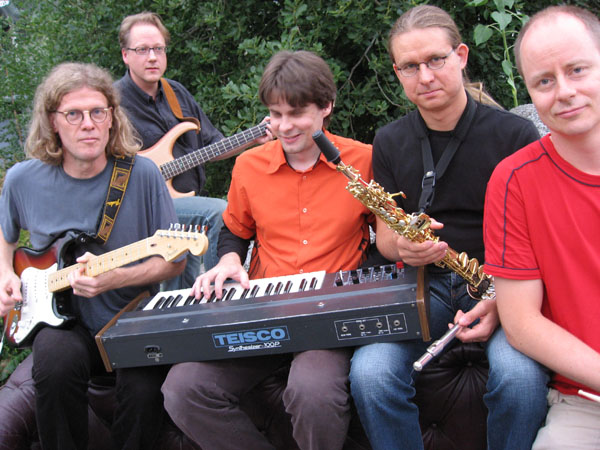Interview

(Progressive Newsletter Nr.66 09/09)
excerpts from an interview with Mikko Uusi-Oukari (Guitar)
We did the groundwork with my workmate, guitarist Aki Laakso in 1998. We rehearsed together for half a year and then started looking for other prog-oriented musicians in Turku area. At the time we used the name "Lost Spectacles" that was changed before the release of the first album. The most important events have been release of our first recording - track "Tuulee niin" in "Tuonen Tytär"- "Tribute of Finnish Progressive" double CD in Mellow Records; release of the first album "Ajatuksia maailman laidalta" in 2006; formation of the current line-up in 2006; and release of the second album "Kahden kuun sirpit" in 2009.
Is there a meaning for the word “Viima” and why did you choose this name?
Viima is Finnish and means strong, cold wind. We still had the old name "Lost Spectacles" at the time of recording our first album, with lyrics of all tracks in Finnish. So a Finnish name was more appropriate. Two tracks in the first album, "Leijonan syksy" and "Ilmalaiva Italia" reflect cold, windy atmospheres and the word "viima" is actually used in "Leijonan syksy" lyrics. We had a whole-night brainstorming about the name change and came with "Viima" as something reflecting the first album.
Why and when did you decide to sing in your mother language?
That was at the time of recording the first album. We recorded the tracks in Finnish and English. The versions with Finnish words were finished and used for the album. The idea was to follow the tradition of 70's Finnish prog. Bands like Haikara, Tabula Rasa, Fantasia, Nova, Nimbus and Scapa Flow used Finnish language. The most famous Finnish prog bands Wigwam and Tasavallan Presidentti sing in English, but both of them have English singers. I think we can express ourselves better in Finnish. And the world is full of bands singing in English.
Between your two albums you had several line-up changes. What were the reasons for that and how difficult was it to find new musicians?
Our singer Päivi Kylmänen moved to Sweden. The first album was finished with her. At the time of making the record there were actually two members left in addition to Päivi: keyboard player Kimmo Lähteenmäki and me. After finishing the album we wanted to have a band with regular rehearsing and making gigs. That would have been impossible with one member living in Sweden. It took some time to find the new players: the bassist Aapo Honkanen was an old work mate of mine, new singer Hannu Hiltula was found with a net-ad and he brought the drummer Mikko Väärälä. The line-up has been the same for 3 and a half years.

In which way did these changes influence your musical style?
The most obvious change was of course the change from Päivi's sensitive, high and folky expression to Hannu's lower and stronger singing. Hannu sings all the material from the first album live and it works fine. Kimmo (the keybord player) played drums in the first album. His playing is more heavy with less nuances than the style of the current drummer Mikko Väärälä. In addition to playing, both Hannu Hiltula and Mikko Väärälä compose music. Hannu composes dark symph/folk prog, while Mikko's symphonic style is more spacious and cheerful with even some pop elements.
Can you tell a little bit more about the lyrics of your songs?
Well, for the most clear example, "Ilmalaiva Italia” from the first album tells the true story of Airship Italy that happened in the beginning of the last century. Hannu Hiltula's songs in the new album, "Autio pelto" and "Unohtunut" are Finnish poetry from the early 20th century. The title track ”Kahden Kuun Sirpit” (”Two Crescents”), combines the history of the city of Turku with story of the character’s life in the city and in the archipelago. The title refers to the way the story handles and modifies the truth. Part of the text is based on reality and the rest reflects it in it’s own way. On the other hand the name also refers to a perfect moment by the warm and calm sea when the moon is shining and is reflected from the glassy sea.
How important is for you to use vintage instruments like analog Synthesizers, Mellotron instead of digital components?
They are very essential part of our sound. It would be very difficult to substitute them with digital instruments.
How difficult is it for you to get gigs and play live?
It is not easy to get listeners for this kind of live music. We usually play with one or two bands to have larger audience. Organizing that kind of concerts needs a lot of work.
Kristian Selm © Progressive Newsletter 2009